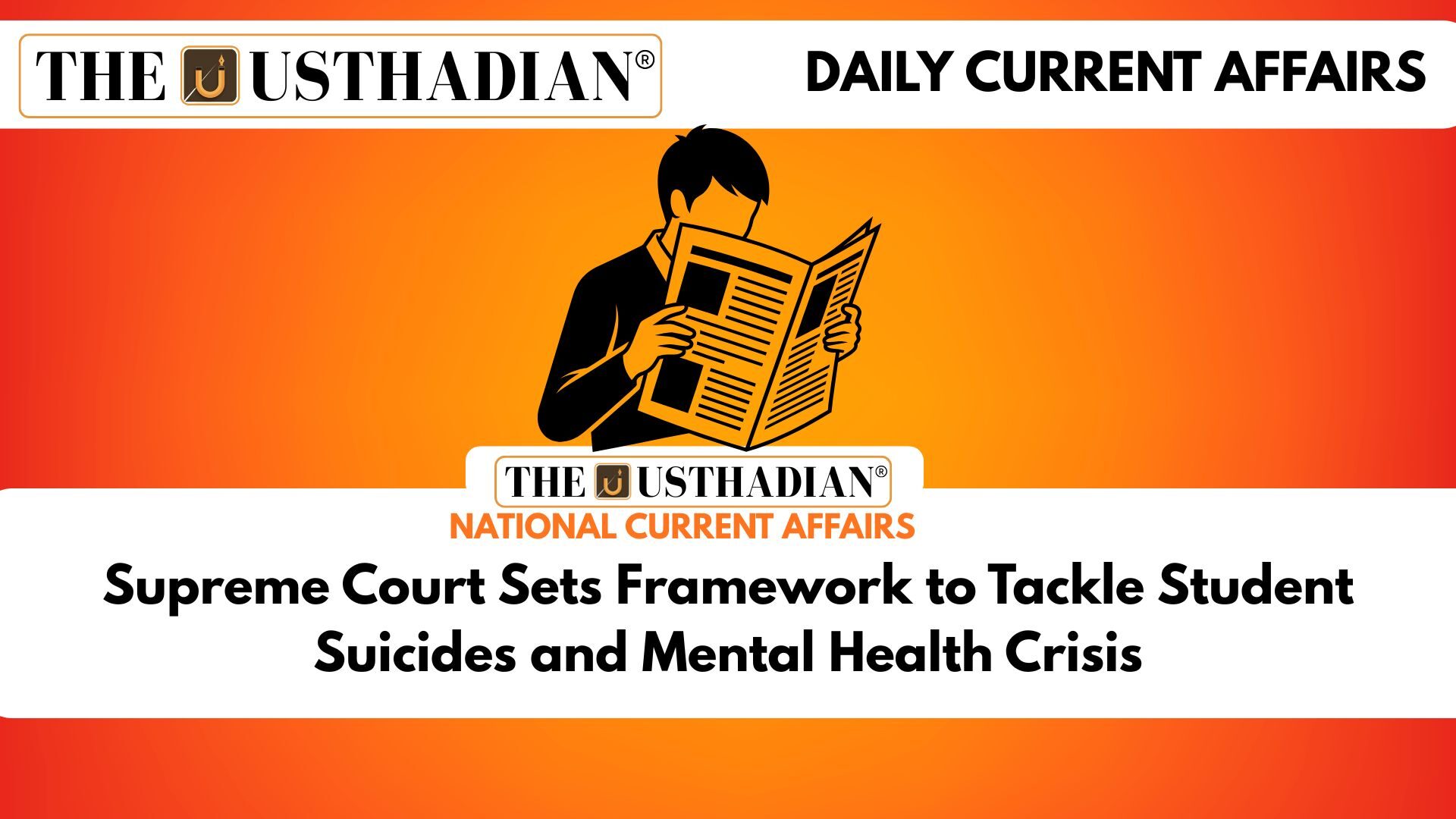Landmark ruling in Sukdeb Saha case
Supreme Court Sets Framework to Tackle Student Suicides and Mental Health Crisis: In a critical move, the Supreme Court of India issued 15 interim guidelines in the Sukdeb Saha vs. State of Andhra Pradesh case to address the alarming rise in student suicides and mental health challenges. These directives, passed under Article 32 and Article 141, are binding across all educational institutions—schools, colleges, and coaching centers—until a comprehensive legislative framework is enacted.
India’s deepening student mental health crisis
India reported 13,000+ student suicides in 2022, representing 7.6% of all suicides, with over 2,200 cases directly linked to exam failures, according to NCRB data. The Court described this as a sign of a “structural malaise” in the education system, emphasizing that academic pressure, identity-based discrimination, and lack of institutional support are contributing to the crisis.
Static GK fact: NCRB stands for National Crime Records Bureau, functioning under the Ministry of Home Affairs.
Mandatory mental health policies in institutions
The Court directed every educational institution to adopt a Mental Health Policy, aligned with national programs like UMMEED, MANODARPAN, and the National Suicide Prevention Strategy. This policy must be publicly available and actively implemented.
Static GK fact: MANODARPAN is a government initiative under Ministry of Education launched during COVID-19 to support students’ mental well-being.
Appointment of mental health professionals
Each institution with over 100 students must appoint at least one qualified mental health counsellor. These professionals will help students identify stress triggers and offer early psychological support.
Anti-discrimination and safety systems
Institutions are strictly prohibited from batch segregation, public shaming, or setting unrealistic academic goals. Confidential reporting systems must be established for sexual assault, ragging, and discrimination based on caste, gender, or identity. Immediate psychosocial support must be provided to victims.
Static GK Tip: The Ragging Act, formally known as the UGC Regulations on Curbing the Menace of Ragging in Higher Educational Institutions (2009), mandates strict action against offenders.
Campus-wide awareness and training
All staff must receive biannual training in identifying mental health red flags and managing crises. Institutions must also prominently display helpline numbers like Tele-MANAS, ensuring access to emergency mental health support.
Static GK fact: Tele-MANAS is India’s 24/7 national tele-mental health service launched in 2022 by the Ministry of Health and Family Welfare.
Inclusive support for vulnerable groups
The Court emphasized creating inclusive environments for students from SC/ST/OBC/EWS, LGBTQ+, and disabled backgrounds. Mental health services must cater to their specific needs, free of stigma or exclusion.
Reducing academic stress and career pressure
Institutions must encourage interest-based career guidance, non-academic engagement, and extracurricular activities to ease exam-related pressure. This shift aims to foster well-rounded student development and lower anxiety levels.
Static Usthadian Current Affairs Table
Supreme Court Sets Framework to Tackle Student Suicides and Mental Health Crisis:
| Topic | Detail |
| Year of Supreme Court ruling | 2024 |
| Case name | Sukdeb Saha vs. State of Andhra Pradesh |
| Article invoked | Article 32 and Article 141 |
| Suicide data (2022) | 13,000+ student suicides; 2,200 due to exam failure |
| Mandatory policy alignment | UMMEED, MANODARPAN, National Suicide Prevention Strategy |
| Mental health staffing rule | 1 counsellor for every 100 students |
| Key helpline platform | Tele-MANAS |
| Staff training frequency | Twice a year (biannual) |
| National data source | NCRB (Ministry of Home Affairs) |
| Inclusive focus groups | SC/ST/OBC/EWS, LGBTQ+, and disabled students |








